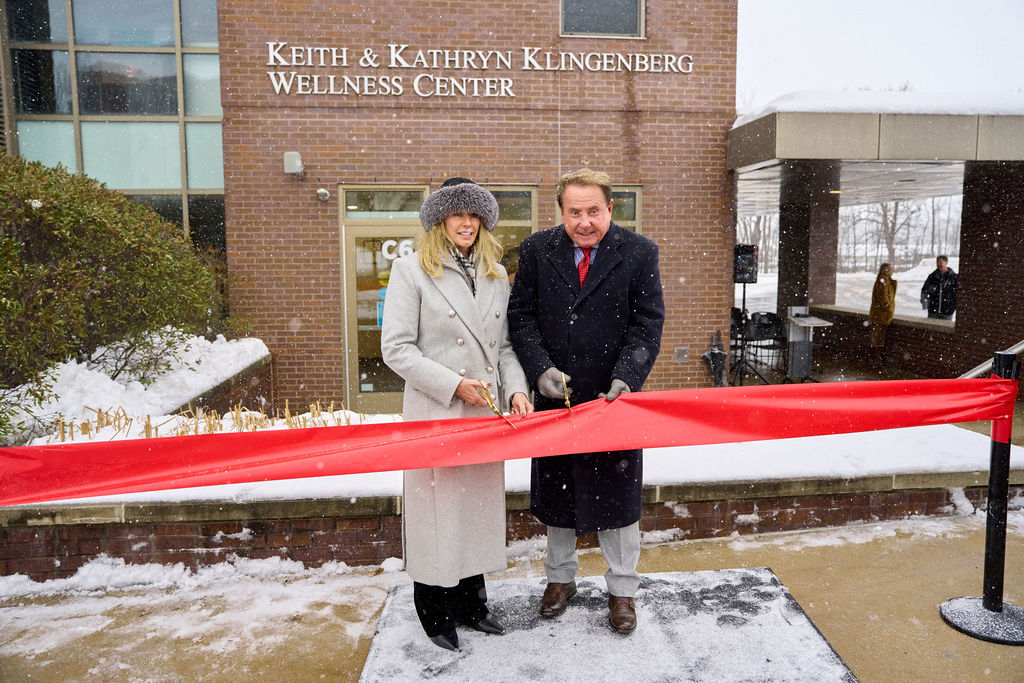Imagine being a nursing student and learning how to treat COVID-19 patients without any hands-on experience with the disease. Thanks to the new curriculum offered at Davenport University, this won’t be a concern for its nursing students and many local hospitals.
Creating a solution
It became clear early in the pandemic that there wasn’t specific training focused on helping students to navigate supporting patients through a pandemic. The Davenport nursing faculty quickly realized they needed to address the training they offered students to ensure they were prepared to care for patients suffering from COVID-19.
Using cutting-edge technology, and leading scientific research, the modules they created safely simulate COVID-19 patient scenarios through a holographic display, enabling students to adapt to the latest trends and treatments in healthcare. The modules have been bundled with a faculty guide and student worksheets to create a new curriculum that is also being shared with healthcare partners in the state of Michigan. More than 500 Davenport nursing students have already completed these modules.
To begin, students simply strap on the holographic headset. Once the headset is on, a virtual patient appears. The nurse then communicates with the patient to learn more about their acute symptoms. Using their hands, the nurse can reach for their equipment and begin to provide patient care – all well getting real-time feedback on how to improve their responses. The holographic headset can be worn by an individual and used for a single learning experience or can be worn by a student or faculty member while others view the virtual interaction on a screen remotely. The remote virtual simulation has enabled Davenport’s Nursing Faculty to create a connected learning environment across Davenport’s four nursing campuses.
The curriculum utilizes evidence-based research from the Johns Hopkins University of Medicine, the American Nurses Foundation and American Nurses Association, the U.S. Department of Veterans Affairs, and GigXR holographic standardized patient software. Davenport was able to tap into funding provided by the Registered Nurse Primary Care Grant to create this innovative approach to its program.
Preparing students for the pandemic
These custom-built modules provide nursing students with a foundational understanding of the COVID-19 disease, treatment process, and first-hand knowledge of how to best care for patients. Upon completing the education modules, students can describe the disease, suggest and begin treatment, identify societal challenges, and follow proper procedures for using personal protective equipment (PPE).
“The safe exposure to the educational modules has allowed future nurses to be both comfortable and knowledgeable when working with prospective COVID-19 patients,” said Dr. Karen Daley, Dean of the College of Health Professions.
The Davenport Nursing Faculty used a clinical competency questionnaire to evaluate the effectiveness of this software and early results indicate improved overall confidence in nursing skill competencies and professional behaviors. This questionnaire measures everything from the nurses’ documentation of the patient’s health, to their ability to apply critical thinking to patient care situations. “Because of the modules, future diagnosis and treatment will be carried out in the safest manner possible for both the patient and all members of the healthcare team,” said Dr. Daley.
Extending the resources to others
The COVID-19 Nursing Student Education Modules and Curriculum are not only benefiting Davenport students but are also being used to help educate healthcare professionals in the state of Michigan. Two partners are actively putting them to good use training both nurses and staff in both primary care and Veterans Affairs facilities. Davenport plans to continue to offer this resource to additional partners in the near future.
To learn more about Davenport’s bachelor of science in nursing or other nursing programs and their advanced teaching techniques, please visit www.davenport.edu/nursing.
This project was supported 2020-2021 by the Health Resources and Services Administration (HRSA) of the U.S. Department of Health and Human Services (HHS) under grant number T1PHP39093 and title Registered Nurse in Primary Care COVID totaling $78,571.00, with 0% financed with nongovernmental sources. This information or content and conclusions are those of the author and should not be construed as the official position or policy of, nor should any endorsements be inferred by HRSA, HHS or the U.S. Government.
Clinical Competency Questionnaire (Liou S, Cheng C. Developing and validating the clinical competence questionnaire: a self-assessment instrument for upcoming baccalaureate nursing graduates. J Nurs Educ Pract. 2014;4(2):56 66.).
Share This Story!
Imagine being a nursing student and learning how to treat COVID-19 patients without any hands-on experience with the disease. Thanks to the new curriculum offered at Davenport University, this won’t be a concern for its nursing students and many local hospitals.
Creating a solution
It became clear early in the pandemic that there wasn’t specific training focused on helping students to navigate supporting patients through a pandemic. The Davenport nursing faculty quickly realized they needed to address the training they offered students to ensure they were prepared to care for patients suffering from COVID-19.
Using cutting-edge technology, and leading scientific research, the modules they created safely simulate COVID-19 patient scenarios through a holographic display, enabling students to adapt to the latest trends and treatments in healthcare. The modules have been bundled with a faculty guide and student worksheets to create a new curriculum that is also being shared with healthcare partners in the state of Michigan. More than 500 Davenport nursing students have already completed these modules.
To begin, students simply strap on the holographic headset. Once the headset is on, a virtual patient appears. The nurse then communicates with the patient to learn more about their acute symptoms. Using their hands, the nurse can reach for their equipment and begin to provide patient care – all well getting real-time feedback on how to improve their responses. The holographic headset can be worn by an individual and used for a single learning experience or can be worn by a student or faculty member while others view the virtual interaction on a screen remotely. The remote virtual simulation has enabled Davenport’s Nursing Faculty to create a connected learning environment across Davenport’s four nursing campuses.
The curriculum utilizes evidence-based research from the Johns Hopkins University of Medicine, the American Nurses Foundation and American Nurses Association, the U.S. Department of Veterans Affairs, and GigXR holographic standardized patient software. Davenport was able to tap into funding provided by the Registered Nurse Primary Care Grant to create this innovative approach to its program.
Preparing students for the pandemic
These custom-built modules provide nursing students with a foundational understanding of the COVID-19 disease, treatment process, and first-hand knowledge of how to best care for patients. Upon completing the education modules, students can describe the disease, suggest and begin treatment, identify societal challenges, and follow proper procedures for using personal protective equipment (PPE).
“The safe exposure to the educational modules has allowed future nurses to be both comfortable and knowledgeable when working with prospective COVID-19 patients,” said Dr. Karen Daley, Dean of the College of Health Professions.
The Davenport Nursing Faculty used a clinical competency questionnaire to evaluate the effectiveness of this software and early results indicate improved overall confidence in nursing skill competencies and professional behaviors. This questionnaire measures everything from the nurses’ documentation of the patient’s health, to their ability to apply critical thinking to patient care situations. “Because of the modules, future diagnosis and treatment will be carried out in the safest manner possible for both the patient and all members of the healthcare team,” said Dr. Daley.
Extending the resources to others
The COVID-19 Nursing Student Education Modules and Curriculum are not only benefiting Davenport students but are also being used to help educate healthcare professionals in the state of Michigan. Two partners are actively putting them to good use training both nurses and staff in both primary care and Veterans Affairs facilities. Davenport plans to continue to offer this resource to additional partners in the near future.
To learn more about Davenport’s bachelor of science in nursing or other nursing programs and their advanced teaching techniques, please visit www.davenport.edu/nursing.
This project was supported 2020-2021 by the Health Resources and Services Administration (HRSA) of the U.S. Department of Health and Human Services (HHS) under grant number T1PHP39093 and title Registered Nurse in Primary Care COVID totaling $78,571.00, with 0% financed with nongovernmental sources. This information or content and conclusions are those of the author and should not be construed as the official position or policy of, nor should any endorsements be inferred by HRSA, HHS or the U.S. Government.
Clinical Competency Questionnaire (Liou S, Cheng C. Developing and validating the clinical competence questionnaire: a self-assessment instrument for upcoming baccalaureate nursing graduates. J Nurs Educ Pract. 2014;4(2):56 66.).
Share This Story!
Stay connected!
Get the latest Davenpost News delivered to your inbox!
Related Stories
Davenport’s 2019 Young Alumni Award recipient Valarie Handy ’08 considers herself a translator for rural communities. Handy works as an [...]
Leaders at Davenport University and the nonprofit Advocates for Latino Student Advancement in Michigan Education (Alsame) announced the spring 2024 [...]
In the early stages of the COVID-19 crisis, it became clear that there was a lack of training available to [...]
Latest Stories
Davenport University partners with Grand Valley State University and Grand Rapids Community College on the community-wide MLK day celebration on [...]
Davenport President Richard J. Pappas addresses attendees. Davenport University leaders, trustees, employees and guests gathered December 10 on [...]
Pictured from left to right: Susan Crkovski, executive campus director-Warren; Davenport student Jeryn Washington, BSN Pre-Licensure program; Davenport student Manar [...]








